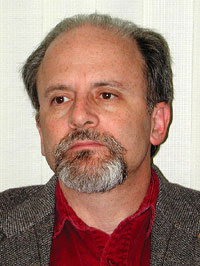
SHSU HOMEPAGE
SHSU NEWS
NEWS LINKS
THE ARTS
SPORTS
ACADEMICS
REGISTRATION
ABOUT SHSU
ADMINISTRATION
SHSU RELATIONS
ANNUAL FUND
DIRECTORIES
THE WEB

Today@Sam | Headlines | Calendar | Experts | Notices | Archives | Search
Terrorism Began Centuries Ago
As Middle Eastern Religious Conflict
 |
This is according to Mitchel P. Roth, a criminal justice historian in the College of Criminal Justice at Sam Houston State University.
"While terrorist activity can be linked to many cultures," Roth said, "most memorably the 'reign of terror' that accompanied the French Revolution in the 1790s, the birth of what we would categorize as terrorist activity predates the French Revolution by centuries."
Middle Eastern terrorism over the centuries has been characterized by political killings and assassinations, said Roth. In fact, the word "assassin" can be traced to a late 11th century Middle Eastern secret religious and political sect known as the Order of Assassins.
For 200 years, Roth said, that order waged a campaign of terror from India to Egypt, under the leadership of Hassan Ben Sabbah, with a devoted band of terrorists carrying out the secret murder of prominent Moslem statesmen and generals.
Modern terrorism often has Muslim/Judaism or Muslim/Christianity implications. In its early form, Roth said, the conflict was between schisms within the Muslim religion.
Two major rival sects rose to prominence in the late 10th century--the Sunni and the Shia. Both followed versions of the Prophet Muhammed's teachings, said Roth.
"Around 1007," he said, "Hassan Ben Sabbah attempted to convince the Shia, centered in Cairo, and the Sunni, with its core in Baghdad, to forsake their own interpretations of the Koran and accept the Ishmaili version."
Hassan was not successful, and established himself as the Ishmaili political leader and embarked on a campaign of terrorism against the Sunni leaders.
A common characteristic of terrorists is fanaticism, as indicated Tuesday by pilots taking over planes and crashing them into political targets in suicide missions.
"Hassan Ben Sabbah has been credited with conditioning and organizing a band of fearless political killers willing to lay their lives down in the struggle for dominance," said Roth. These individuals were selected for their lower than average intellects, and were known as the "fedai", or Fedayeen, which translates to "Men of Sacrifice."
Middle Eastern revolutionaries today call themselves Fedayeen. As then, many are apparently convinced that their reward for dying for their beliefs is automatic entry into paradise. Ben Hassan paid them in advance so the money could be given to their family survivors.
"It will never be known how many political murders were committed under the influence of Ben Hassan," said Roth, "but most authorities suggest that during his 30 years of activity it was close hundreds."
Some believe that removing a terrorist leader such as Osama bin Laden, who has not been definitely linked to Tuesday's attacks, might decrease such violence worldwide. This was the case almost a thousand years ago.
"After his death in 1091, the Assassins continued as a political organization," said Roth, "but without Ben Hassan's leadership and influence, the organization lost much of its effectiveness as a terrorist organization."
- END -
SHSU Media Contact: Frank Krystyniak
Sept. 12, 2001
Please send comments, corrections, news tips to Today@Sam.edu
This page maintained by SHSU's Office of Public Relations
Director: Frank Krystyniak
Communications Coordinator: Julia May
Located in the SHSU University Advancement Building
Telephone: 936.294.1836; Fax: 936.294.1834
